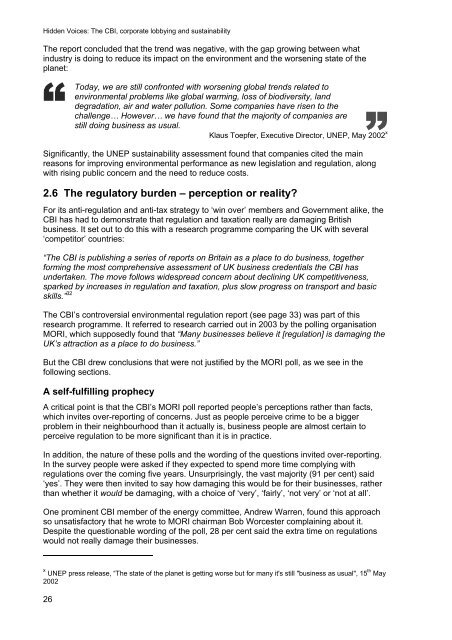hidden_voices
hidden_voices
hidden_voices
Create successful ePaper yourself
Turn your PDF publications into a flip-book with our unique Google optimized e-Paper software.
Hidden Voices: The CBI, corporate lobbying and sustainabilityThe report concluded that the trend was negative, with the gap growing between whatindustry is doing to reduce its impact on the environment and the worsening state of theplanet:Today, we are still confronted with worsening global trends related toenvironmental problems like global warming, loss of biodiversity, landdegradation, air and water pollution. Some companies have risen to thechallenge… However… we have found that the majority of companies arestill doing business as usual.Klaus Toepfer, Executive Director, UNEP, May 2002 xSignificantly, the UNEP sustainability assessment found that companies cited the mainreasons for improving environmental performance as new legislation and regulation, alongwith rising public concern and the need to reduce costs.2.6 The regulatory burden – perception or reality?For its anti-regulation and anti-tax strategy to ‘win over’ members and Government alike, theCBI has had to demonstrate that regulation and taxation really are damaging Britishbusiness. It set out to do this with a research programme comparing the UK with several‘competitor’ countries:“The CBI is publishing a series of reports on Britain as a place to do business, togetherforming the most comprehensive assessment of UK business credentials the CBI hasundertaken. The move follows widespread concern about declining UK competitiveness,sparked by increases in regulation and taxation, plus slow progress on transport and basicskills.” 32The CBI’s controversial environmental regulation report (see page 33) was part of thisresearch programme. It referred to research carried out in 2003 by the polling organisationMORI, which supposedly found that “Many businesses believe it [regulation] is damaging theUK’s attraction as a place to do business.”But the CBI drew conclusions that were not justified by the MORI poll, as we see in thefollowing sections.A self-fulfilling prophecyA critical point is that the CBI’s MORI poll reported people’s perceptions rather than facts,which invites over-reporting of concerns. Just as people perceive crime to be a biggerproblem in their neighbourhood than it actually is, business people are almost certain toperceive regulation to be more significant than it is in practice.In addition, the nature of these polls and the wording of the questions invited over-reporting.In the survey people were asked if they expected to spend more time complying withregulations over the coming five years. Unsurprisingly, the vast majority (91 per cent) said‘yes’. They were then invited to say how damaging this would be for their businesses, ratherthan whether it would be damaging, with a choice of ‘very’, ‘fairly’, ‘not very’ or ‘not at all’.One prominent CBI member of the energy committee, Andrew Warren, found this approachso unsatisfactory that he wrote to MORI chairman Bob Worcester complaining about it.Despite the questionable wording of the poll, 28 per cent said the extra time on regulationswould not really damage their businesses.x UNEP press release, “The state of the planet is getting worse but for many it's still "business as usual", 15 th May200226


